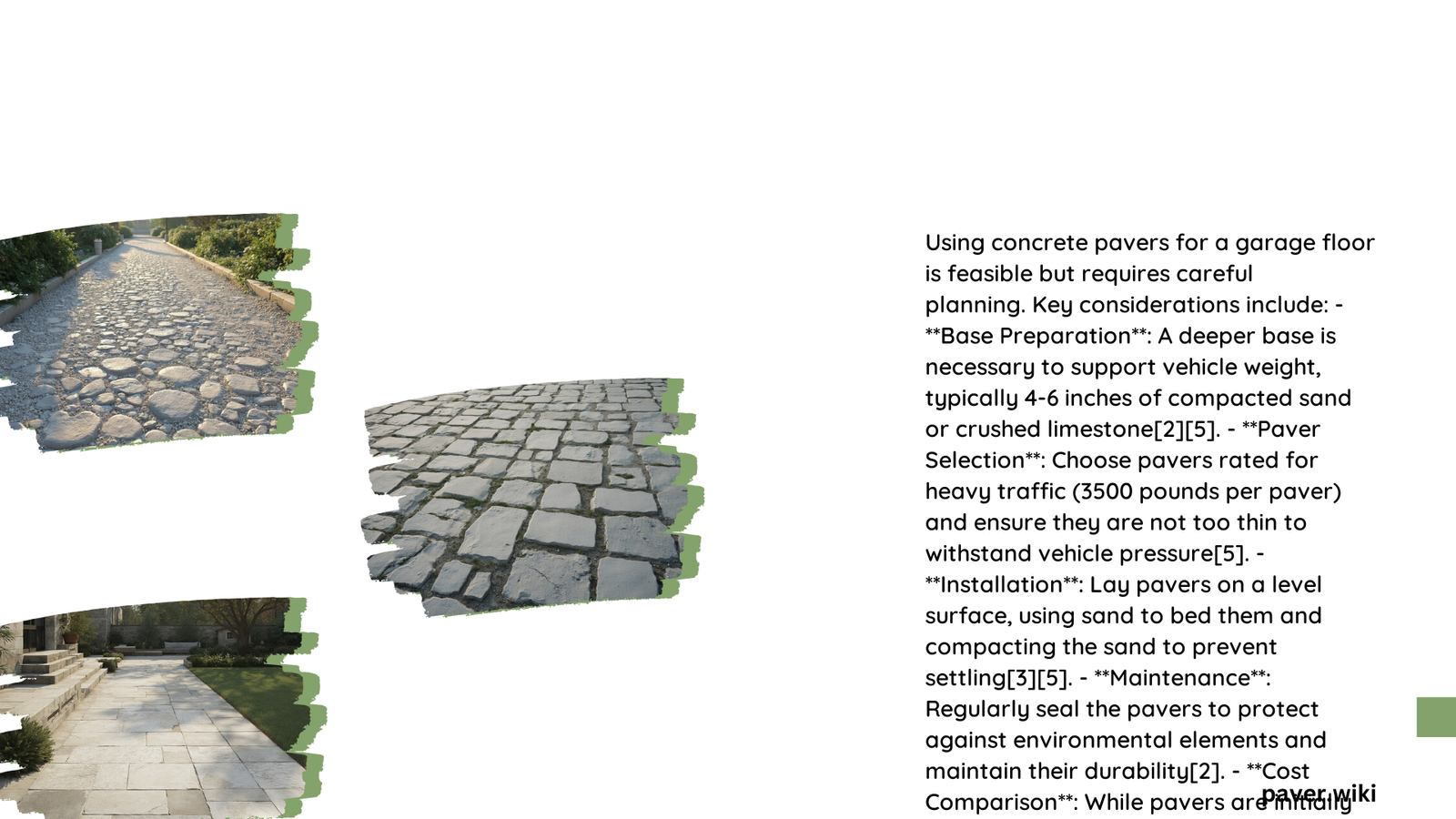Concrete pavers offer a durable, versatile, and aesthetically pleasing option for garage floors. They provide excellent load-bearing capacity, resist cracking, and can last for decades with proper installation and maintenance. Concrete pavers come in various colors, patterns, and textures, allowing homeowners to customize their garage floors to match their style preferences. This guide explores the installation process, durability metrics, maintenance best practices, and design options for concrete pavers garage floors.
What Are the Installation Techniques for Concrete Pavers Garage Floor?
Installing concrete pavers on a garage floor requires careful preparation and execution. Here’s a step-by-step process:
- Base Preparation
- Mark the perimeter and excavate to the required depth
- Lay geotextile fabric to prevent weed growth and stabilize soil
-
Spread and compact gravel in layers
-
Setting Bed
- Prepare a 5/8\” to 1\” layer of crushed gravel or stone dust
-
Level the surface using rigid pipes and a straight plank
-
Laying Pavers
- Install edging around the perimeter
- Start in a right-angled corner and lay pavers with small gaps
-
Check alignment regularly
-
Joint Filling
- Brush polymeric sand over the pavers
- Use a vibrating plate compactor to settle pavers and fill joints
Required Tools for Installation
- Geotextile fabric
- Gravel and crushed stone
- Pavers and edging material
- Polymeric sand
- Vibrating plate compactor
- Leveling tools
- Broom and cutting tools
How Durable Are Concrete Pavers for Garage Floors?

Concrete pavers offer excellent durability for garage floors:
- Load-Bearing Capacity: Can handle typical vehicle weights when properly installed
- Crack Resistance: Solid base and proper installation reduce cracking risk
- Lifespan: Can last several decades with proper maintenance
What Are the Best Practices for Maintaining Concrete Pavers Garage Floor?
To keep your concrete pavers garage floor in top condition:
- Regular Cleaning
- Sweep debris regularly
- Use mild detergent and water for cleaning
-
Avoid harsh chemicals and high-pressure washing
-
Sealing
- Apply paver sealant to protect from stains and enhance appearance
-
Follow manufacturer’s instructions for application
-
Periodic Inspection
- Check for shifting or joint gaps
- Reapply polymeric sand as needed
What Design Options Are Available for Concrete Pavers Garage Floor?
Customize your garage floor with various design options:
- Color Choices
- Wide range of colors available
-
Match or contrast with surrounding environment
-
Patterns
- Straight, herringbone, or diamond patterns
-
Add visual interest to the garage floor
-
Surface Textures
- Smooth, textured, or stamped surfaces
- Affect aesthetics and functionality (e.g., slip resistance)
| Design Element | Options |
|---|---|
| Colors | Various shades and hues |
| Patterns | Straight, herringbone, diamond |
| Textures | Smooth, textured, stamped |
How to Choose the Right Concrete Pavers for Your Garage Floor?
Consider these factors when selecting concrete pavers:
- Traffic Load: Choose pavers rated for vehicle weight
- Climate: Select pavers suitable for your local weather conditions
- Aesthetics: Pick colors and patterns that complement your home
- Maintenance: Consider ease of cleaning and long-term care
What Are the Advantages of Concrete Pavers Over Other Garage Flooring Options?
Concrete pavers offer several benefits:
- Durability and long lifespan
- Easy replacement of individual pavers if damaged
- Variety of design options
- Permeable options for better drainage
- Resistance to oil and chemical stains
How Much Does a Concrete Pavers Garage Floor Cost?
The cost of a concrete pavers garage floor can vary based on:
- Material Quality: Higher-end pavers cost more
- Installation Complexity: Intricate patterns may increase labor costs
- Garage Size: Larger areas require more materials and labor
- Preparation Work: Existing floor condition affects preparation costs
On average, expect to pay between $10 to $30 per square foot for materials and professional installation.
What Are Common Mistakes to Avoid When Installing Concrete Pavers Garage Floor?
Avoid these pitfalls for a successful installation:
- Inadequate base preparation
- Improper drainage planning
- Uneven paver spacing
- Insufficient joint filling
- Neglecting edge restraints
How Does a Concrete Pavers Garage Floor Compare to Epoxy Flooring?
| Factor | Concrete Pavers | Epoxy Flooring |
|---|---|---|
| Durability | Excellent | Good |
| Installation Time | Longer | Shorter |
| Repair Ease | Easy to replace individual pavers | Difficult to repair |
| Design Options | Wide variety | Limited to colors and patterns |
| Cost | Generally higher | Generally lower |
What Are the Environmental Benefits of Concrete Pavers Garage Floor?
Concrete pavers can offer environmental advantages:
- Permeable options allow water infiltration
- Made from natural materials
- Potential for recycled content
- Long lifespan reduces replacement frequency
By choosing concrete pavers for your garage floor, you’re investing in a durable, customizable, and potentially eco-friendly solution that can enhance both the functionality and aesthetics of your garage space.
References:
1. https://www.rona.ca/en/workshop/diy/lay-concrete-pavers-or-patio-slabs
2. https://beginninginthemiddle.com/diypaverwalkway/
3. https://www.instructables.com/Concrete-Paver-Floor/
